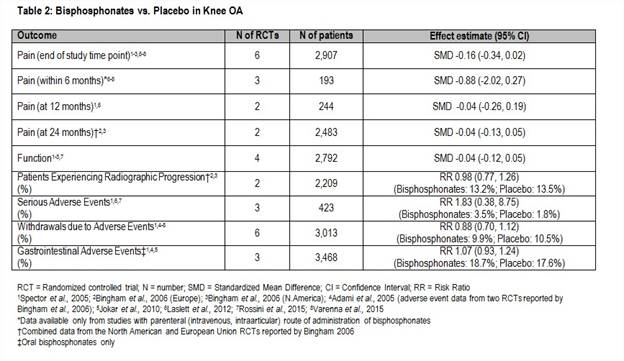Session Information
Date: Monday, November 6, 2017
Title: Osteoarthritis – Clinical Aspects Poster I: Clinical Trials and Interventions
Session Type: ACR Poster Session B
Session Time: 9:00AM-11:00AM
Background/Purpose:
One of the key aspects of osteoarthritis (OA) pathogenesis is subchondral bone remodeling. Bisphosphonates have been touted as disease-modifying agents for OA due to their ability to limit excessive bone remodeling and block osteoclast-mediated pain pathways. Prior meta-analyses on the topic suggested efficacy of bisphosphonates in OA but had major methodological flaws in data extraction and analyses, resulting in misleading conclusions. The latest review combined observational studies with randomized controlled trials (RCTs) in the same analysis, blended various OA sites, and mixed active with placebo comparators; this produced high heterogeneity (I2 up to 99%). We aimed to elucidate the true effects of bisphosphonates using rigorously implemented meta-analysis of RCTs. We chose to isolate our analysis to knee OA patients, because this population is more homogenous and has been widely studied.
Methods:
We searched Medline, EMBASE, Google Scholar, Web of Science, and Cochrane Database from inception until April 2017 and hand-searched reference lists. We included only RCTs in knee OA patients that compared any bisphosphonates vs. placebo and reported validated pain and function scales, radiographic progression, and adverse events outcomes. Studies using active comparators or concomitant medications besides NSAIDs and acetaminophen were excluded. We calculated standardized mean differences to account for variation in outcome scales. Random effects meta-analyses were performed.
Results:
We included seven RCTs (3,013 patients, 69% female) (Table 1). Most patients (N=2,767) received oral risedronate, and a majority were taking concomitant NSAIDs. No pain or function outcomes, regardless of dose, route, time point or measuring instrument, revealed statistically significant results (Table 2). Similarly, we found no statistically significant effect on radiographic progression. One small RCT in patients with bone marrow lesions (BML) suggested a reduction in BML size at 6 months. Bisphosphonates displayed good tolerability, with no statistically significant differences in adverse event outcomes vs. placebo.
Conclusion:
Contrary to prior reviews, our analysis showed that bisphosphonates neither provide symptomatic relief nor defer radiographic progression in knee OA. However, these agents may still be beneficial in certain subsets of patients who display high rates of subchondral bone turnover. Future studies should be directed at defining such OA subsets and investigating the effects of bisphosphonates in those patients.
To cite this abstract in AMA style:
Osani MC, Vaysbrot E, Bannuru RR, Musetti MC, McAlindon TE. Are Bisphosphonates Efficacious in Knee Osteoarthritis? A Meta-Analysis of Randomized Controlled Trials [abstract]. Arthritis Rheumatol. 2017; 69 (suppl 10). https://acrabstracts.org/abstract/are-bisphosphonates-efficacious-in-knee-osteoarthritis-a-meta-analysis-of-randomized-controlled-trials/. Accessed .« Back to 2017 ACR/ARHP Annual Meeting
ACR Meeting Abstracts - https://acrabstracts.org/abstract/are-bisphosphonates-efficacious-in-knee-osteoarthritis-a-meta-analysis-of-randomized-controlled-trials/


